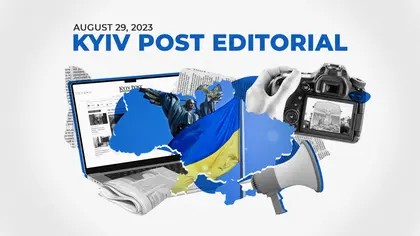Religion is a sensitive sphere. And Kyiv Post doesn’t wade into it unless there are political or other pertinent implications that warrant it.
But the latest shocking statements from the head of the Catholic Church, Pope Francis, about Russia and its imperial past, cannot be left without comment.
As Kyiv Post has reported, in an Aug. 25 video broadcast to Russian Catholic youth, the Argentinian-born Pontiff extolled the Russian Empire and its imperial legacy, praising two of its most ruthless rulers.
In doing so, he not only neglected to mention the plight of Ukrainians and other nations under Russian imperial domination but seemed to play up to the chauvinist narrative that Moscow’s current tsar, President Vladimir Putin, is promoting to justify his barbaric war on Ukraine.
The Pope has thereby ridden roughshod over the sensitivities of Ukraine’s Catholic Church with its long history of resilience, heroism, martyrdom, creativity, and loyalty to the Holy See, despite all the obstacles it was forced to face. In effect, through his brazen appeasement of Russia, the Pope has publicly betrayed his Ukrainian Catholic fold, embarrassing its hierarchy and faithful.
The Pope’s behavior is likely to force Ukrainian Catholics to review the wisdom of their remaining under the authority of a Pontiff who appears to side with their mortal enemy – Russian imperialism
His comments, so deeply offensive to Ukrainians and other former or current victims of Russian imperialism, demand a prompt rebuke and strong condemnation. These have already been delivered by a spokesperson for the Ukrainian Foreign Affairs Ministry and the head of the Ukrainian Greek Catholic Church, Major Archbishop Sviatoslav Shevchuk, who had studied for the priesthood in Argentina.

EU Transfers €1.5 Bln Raised From Russian Assets for Ukraine
But the Pope’s behavior is also likely to force many Ukrainian Catholics to review the wisdom of their remaining under the authority of a Pontiff who appears to side with their mortal enemy – Russian imperialism and its traditional vehicle, the Russian Orthodox Church. His attitude has certainly reopened old questions and wounds.
A history of slights, persecution and survival
Back in 1596, it made sense for some Ukrainian Orthodox, tracing their Christian heritage to the medieval proto-Ukrainian state of Kyivan Rus to unite with the Catholic Church at the Union of Brest for political and other reasons. But only on the condition that as “Uniates” they could retain their Byzantine rite, married clergy and structural autonomy, which for them would best be embodied in a distinct Patriarchate of their own.
In the Russian Empire the Uniates were banned and persecuted. But the Greek Catholic Church flourished in Western Ukrainian under Austro-Hungarian and then Polish rule. When the Soviets took control of the nationalistically recalcitrant region, they immediately banned this Church and imprisoned or killed its hierarchs.
After the release in 1962 from the Soviet Gulag of Archbishop Iosyf Slipyi, the head of the Ukrainian Greek Catholic Church, and his appearance as a martyr and hero at the Second Vatican Council, Ukrainian Catholics hoped that the Vatican would finally fully recognize the inherent rights of their Church through the establishment of a Ukrainian Catholic Patriarchate. Instead, the Vatican opted for elevating Archbishop Slipyi, first to the rank of a Major Archbishop, then to that of a cardinal but reneged on the issue of the establishment of a Ukrainian Patriarchate.
Under Pope Paul VI, in the 1970s, the Vatican launched its so called Ostpolitik. Ostensibly, its purpose was to seek reconciliation with the Russian Orthodox Church. But it was perceived by others, especially the Ukrainian Catholics, as a sellout of its own Ukrainian adherents in the name of a rapprochement with a politized Russian church under Soviet control.
The Ukrainian Catholic Church was all this time still persecuted by the Soviet regime and forced to operate in the underground. It was not until 1989 – late into Soviet leader Mikhail Gorbachev’s more liberal phase – that it was finally legalized in the USSR and permitted to reemerge into the open as the significant force that it had remained in Western Ukraine as “catacomb church.”
The Ukrainians and Poles had had their difficulties in the past, but the first Slavic Pope, the Pole John Paul II (born Karol Wojtyła), was much more sympathetic to the Ukrainians and their cause, and the Ukrainian Catholics in particular. He visited Ukraine in 2001. But even he did not permit the establishment of a Ukrainian Catholic Patriarchate.
So now, again, the leadership of the Ukrainian Catholic Church has been put on the spot by the Vatican’s callousness, condescension and appeasement of Moscow.
Can the present pope be as foolish and tactless as he appears? Is he himself the author of these cynical gestures of appeasement towards a Russia conducting horrific war crimes against Ukraine and targeting believers and their places of worship, ancient holy shrines, regardless of their religious affiliation? Or is someone putting the ailing geriatric up to this – pro-Russian elements among his advisers in the Curia?
Whatever the case, certain things seem obvious enough after the Pope has discredited himself so badly in the eyes of Ukrainian, and presumably other Christians.
No to any envisaged invitation for Pope Francis to visit Ukraine – an idea that’s been officially mooted. Given his readiness to assume the role of a fellow traveler or “useful idiot” in the Kremlin’s eyes, the Pope’s presence might make sense at a convention of the BRICS grouping, where empathy for Moscow’s narrative is the norm, but not in Ukraine.
And yes to the acceleration and deepening of discussions between the Orthodox Church of Ukraine and the Ukrainian Catholic Church about drawing closer and realizing an age-old goal – the creation of a united Ukrainian Patriarchate.
You can also highlight the text and press Ctrl + Enter






